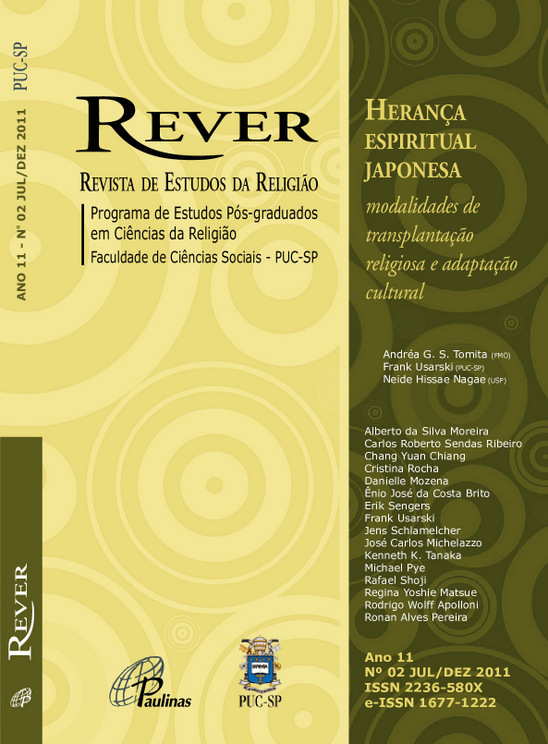Budismo Étnico em Perspectiva Comparada: Herança das Missões Japonesas no Brasil
Palavras-chave:
Cristianismo, Xintoísmo, Nikkei, imigração, redes sociaisResumo
Após uma contextualização dos fluxos imigratórios entre o Japão e o Brasil, o artigo se concentrará na história e sociologia do Cristianismo entre os nipo-brasileiros. O Catolicismo brasileiro seguiu a tendência de subsistiu o Xintoísmo como religião de pertencimento nacional nas novas gerações nikkei, mas dados recentes sobre as religiões brasileiras no Japão indicam o crescimento do movimento pentecostal entre os decasségui. Seguindo uma perspectiva teórica dada pela economia das religiões e por redes sociais, buscam-se as principais explicações para o crescimento pentecostal. Ao final são apontadas algumas tendências referentes ao futuro do Cristianismo e de outras religiões entre os brasileiros no Japão.Métricas
Carregando Métricas ...
Downloads
Como Citar
Shoji, R. (2012). Budismo Étnico em Perspectiva Comparada: Herança das Missões Japonesas no Brasil. REVER: Revista De Estudos Da Religião, 11(2), 63–86. Recuperado de https://revistas.pucsp.br/index.php/rever/article/view/8150
Edição
Seção
Seção Temática
Licença

Este trabalho está licenciado sob uma licença Creative Commons Attribution-NonCommercial 4.0 International License.
Autores que publicam nesta revista concordam com os seguintes termos:
- Autores mantém os direitos autorais e concedem à revista o direito de primeira publicação, com o trabalho simultaneamente licenciado sob a Licença Attribution-NonCommercial 4.0 International, que permite o compartilhamento do trabalho com reconhecimento da autoria e publicação inicial nesta revista.
- Autores têm autorização para assumir contratos adicionais separadamente, para distribuição não exclusiva da versão do trabalho publicada nesta revista (ex.: publicar em repositório institucional ou como capítulo de livro), com reconhecimento de autoria e publicação inicial nesta revista.


